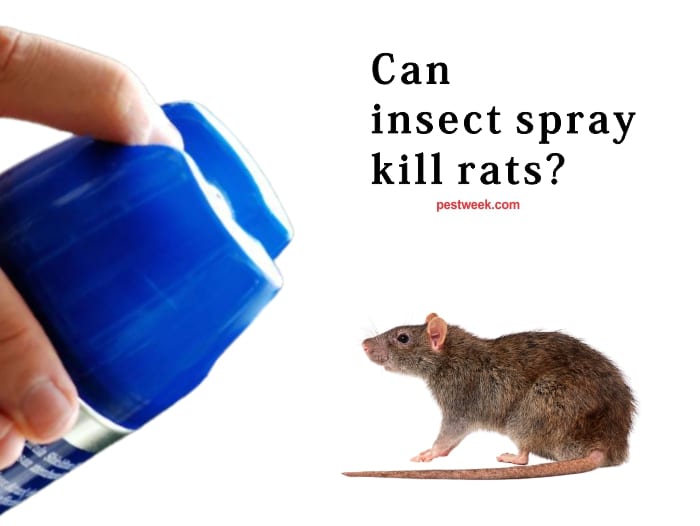Have you ever wondered, “Can Insect Spray Kill Rats?”.
In this blog, we delve into the intriguing world of pest control, exploring the effectiveness and safety of using insect spray to combat rats.

Can Insect Spray Kill Rats?
Insect spray can kill rats because it contains DEET, which is extremely toxic. However, it will only work if the rodents are trapped and sprayed in a closed area. Insect spray can also repel rats instantly because it irritates their eyes and nose.
Bug repellents will only deter rats for a few minutes because they become less efficient in an open space. This makes them a temporary solution against rats and mice. Several alternatives, including rat traps and homemade poisons, are recommended.
Effects of insect spray on rats
N, N-Diethyl-meta-toluamide, also known as DEET, is an active component in bug repellents that can severe tremors and paralysis in rats. This can only happen if the rats are trapped in a closed area with zero air circulation.
“Insect spray will kill rats if you spray it in their hiding holes and block the entrance. Bug spray takes 5-10 minutes to begin affecting a rat’s nervous system. If rats and mice remain trapped in an air-tight place that has been sprayed for more than 1 hour, they will die.”
Rats sneeze when in contact with bug spray because of the choking chemicals. However, this will only happen if they are exposed to significant quantities.
If you hold an insect spray close enough to rats and spray them, they will have an intense stomach upset with nausea.
Note that the same effects can also reflect on you. Before you do spray them, cover your nose and keep away from the pesticide fumes.
Is it safe to use insect spray to get rid of Rats?
It is never safe to spray rats with insect repellents because the effects are likely to affect you and your pets. Depending on the brand, some insect sprays can cause severe reactions, I.e., seizures and loss of breath in cats and dogs.
If you have rats in your bedroom, it is not okay to use bug sprays against them, especially at night. Inhaling DEET and pyrethrins, common in bug sprays for a long time, can cause severe breathing problems.
Pros and cons when using Insect Spray Kill Rats
Insect spray can be harmful to rats because it contains a toxic chemical called DEET. However, it can only work if you manage to trap the rats and spray them in a closed space. Insect spray can also make rats uncomfortable because it stings their eyes and noses, which might make them leave the area.
But here’s the thing: using insect spray as a treatment for a rat problem isn’t a good idea. There are special rat repellent sprays, but even those can have their downsides. They often use strong chemicals that aren’t great for getting rid of rat infestations effectively.
One more important thing to remember: insect sprays can be harmful to people and pets if not used correctly. Breathing in DEET and pyrethrins, which are common in bug sprays, can lead to serious breathing problems. So, it’s best not to use these sprays in your bedroom at night.
Conclusion
In conclusion, we’ve explored the intriguing question of whether “Can Insect Spray Kill Rats.”
Don’t forget to explore more informative blogs from Pestweek to stay well-informed on all things pest-related.

Calina Mabel has over 15 years of experience in the field of journalism and communications. Currently, Calina Mabel is the Content Writer for categories such as Cockroach, Ants, Bed Bugs, Mosquito, Rodent, Termite, and Flies on Pestweek.com. She aims to build content for these categories with a focus on providing valuable and accessible information to readers, in order to create the world’s largest knowledge community about Pests.
All content written by Calina Mabel has been reviewed by Emily Carter.

